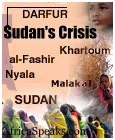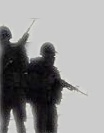 |






 AfricaSpeaks Weblog AfricaSpeaks Weblog
 Rootswomen Weblog Rootswomen Weblog
 Rootsie's Weblog Rootsie's Weblog
|
Hungry Villagers Praise Saddam
Posted: Friday, March 28, 2003
Mark Magnier, LA Times via Arab News
SAFWAN, Iraq, 28 March 2003 - As the first aid convoys rolled into southern Iraq on Wednesday, a cheer went up from several hundred Safwan villagers who jumped on running boards and banged the sides of 18-wheeler trucks.
But even before the drivers had opened their doors, several dozen of the assembled turned the cheers into a song: "We give our blood and hearts to Saddam!" they chanted and danced, the volume growing as defiance swept the crowd.
When the lumbering trucks swung around and their back doors opened, a near-riot erupted as villagers tore at each other’s clothing to get at the prized white boxes filled with bread, cheese, juice packets and chicken. Banners taped to the boxes — announcing them as a gift from the Kuwait Red Crescent Society — followed the aid packages onto the muddy ground.
"They're purposely trying to humiliate us and make us look like animals," said Nasser Shami, 27, a history student, as he watched the scrum, refusing to participate. "They brought reporters here to humiliate us before the world and make us look like animals. At least we had our pride before."
After days of delay caused by unexpectedly heavy fighting, sandstorms and a mined harbor, aid from the United States and its partners finally began to flow into southern Iraq on Wednesday, reaching Safwan and the port of Umm Qasr. Kuwait delivered five trucks; the United States dispatched seven. But in Safwan at least, the initial effort to ease suffering and build bridges to the Iraqi people appeared to backfire.
A rough, survival-of-the-fittest order developed within minutes. Strong young men dominated the area closest to the truck's doors, while old women and small children circled the periphery looking for items that might have fallen unnoticed.
"I want a box, but I'm too afraid," said 11-year-old Yusef Farez. Nearby, well-built Ahmed Ali Hussein, 25, guarded 10 boxes he and his friends had snagged. "This isn't enough," Hussein said. "If we were better organized, we would have gotten more."
According to the United Nations, 60 percent of Iraq's 22 million people are completely dependent on food aid. Safwan villagers said they needed the meals — even as they criticized the source, the delayed delivery and the world's failure to address many of their other concerns. Safwan's electricity is out, water supplies are drying up, there is no medical system and civilian casualties are rising.
"We hear they're supposed to set up a hospital, but there's been no help," said Ali Hussein, 20 and unemployed. Mustafa Kamal, also 20, a student, accused US and British forces of attacking civilians with helicopters for no apparent reason.
Such statement could not be verified, given the chaos of war and reports that Iraqi soldiers have used civilian homes and vehicles for cover. What is eminently clear, however, is the anger and sense of injustice that Kamal and other Iraqis are expressing.
"We hate Americans and aren't afraid of the Allied army," he said. "Why are they killing us? We have no weapons. Come at night and see for yourself."
The United States and its partners have struggled to find the right balance between military might — which they need to unseat Saddam Hussein's regime — and a nuanced hearts-and-minds campaign required to win over the Iraqi people. "We face an awful dilemma," said Peter Galbraith, a former US ambassador and expert on Iraq. "To dislodge the forces in the cities, we have to use such force that we will alienate the people we've come to liberate. That's exactly what Saddam is counting on."
Suggestions that Iraqis might mount a rebellion farther north in Basra or elsewhere against the regime drew scoffs. "America thought there would be an uprising against Saddam Hussein, but nothing like that has happened and it won't," said Adnan Mohamed, 24, a former soldier. "We'll fight." One villager, however, hinted that members of Saddam's Baath Party had pressured Safwan locals to decry the Americans, British and Kuwaitis even as they accepted the foreign aid.
A US soldier surveying the scene said he thought Allied forces were making progress with the Iraqi people. "I believe most people here are putting on a show for Saddam Hussein," Staff Sgt. John Monds said. "I've felt no hostility."
http://www2.arabnews.com/Article.asp?ID=24374
 Printer friendly version Printer friendly version
 Send page by E-Mail Send page by E-Mail
|








